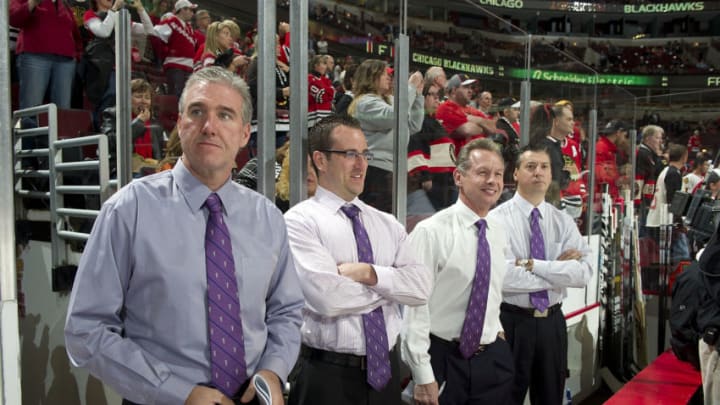Former Chicago Blackhawks assistant coach Mike Haviland has continued his success excelling in player development well beyond being axed from the NHL club
Over the years, the Chicago Blackhawks have played an on going game of musical chairs when it comes to assistant coaches under Joel Quenneville. It seems like when the ‘Hawks turn in a disappointing season, the assistants are usually the ones to take the fall. But six years ago when the music stopped, Mike Haviland should’ve had a chair.
It was after the 2011-12 season when Haviland was released by the Blackhawks, ironically after two first-round defeats following the Blackhawks’ first Stanley Cup in almost 50 years. That year, the ‘Hawks special teams struggled, finishing 26th in the league on the powerplay and 27th on the penalty kill.
In an article from the Chicago Tribune by Chris Kuc, Quenneville talks about “dysfunction” within the coaching staff and how general manger Stan Bowman let him make the decision on how to move forward.
Quenneville said there was the option to stand pat, but he chose to let Haviland go and keep longtime friend and assistant coach Mike Kitchen, who many thought deserved to go at the time.
Kitchen was let go after the 2017 season when the same circumstances came around. The team was defeated in two straight first-round playoff series, but this time the decision wasn’t Quenneville’s.
Haviland’s coaching history
More from Editorials
- Blackhawks: List Of Things To Be Thankful For This Thanksgiving
- Blackhawks: Changes to the coaching staff are a step in the right direction
- Chicago Blackhawks: Reasons for optimism and cause for concern
- Blackhawks: Kick off four game road trip against Kraken
- Recapping the Jeremy Colliton era with the Chicago Blackhawks
Haviland worked for the Blackhawks from 2008 until 2012 and was part of breaking one of the longest championship droughts in Chicago history. But before he was with the Blackhawks organization, he had success at multiple levels.
From 2001 to 2005, he was a head coach in the ECHL with the Atlantic City Boardwalk Bullies and the Trenton Titans. He won a Kelly Cup championship with both teams and had an overall record in the ECHL of 172-81-35.
After coaching in the ECHL, Haviland moved up to the AHL where he coached the Norfolk Admirals from 2005-07. His record in those two years was 93-51-10-6, and he won coach of the year in 2007. He took over the Rockford IceHogs the following year and coached the team for two years with a record of 44-26-4-6.
Post-Blackhawks career
After his career with the Blackhawks, Haviland took an assistant coaching position with the Norfolk Admirals and then a head coaching position with the Hershey Bears in 2013. But his most recent project has been the Colorado College Tigers of Colorado Springs, whom he has been with since 2014.
Haviland’s first two seasons with the Tigers were disappointing, only having six wins each year, but the team has continued to improve since. In his third season, the team won eight games, and this season it has already won 12 games.
The most notable quality about Haviland’s influence on this Division I program has been his ability to help young players break out. Haviland helped 15 players reach career-high point totals, and he was a mentor to now-Carolina Hurricanes defenseman Jaccob Slavin.
This season, the Tigers’ top scorers — Mason Bergh, Trey Bradley, and Nick Halloran — are all having breakout years. In the NCHC Conference that is loaded with future NHL talent, Colorado College still competes and continues to build its program. In time, the Tigers will be back in contention for another NCAA title.
Analysis
Looking at the Blackhawks’ current situation and how the team has been structured, the Blackhawks have to be continually developing and teaching young players how to contribute. The 2010 Blackhawks had a lot of raw talent, but they still got scoring from their depth. Young players were making transitions quickly to the NHL level and having fun basking in newfound success.
Quenneville has been fortunate to have such a great core group of players, but as age continues to catch up to them, the Blackhawks find themselves in a similar position as they were six years ago. They have to figure out how to find diamonds in the rough and polish them into contributing players for the system.
Next: Positives From a Down Blackhawks 2017-18 Season
It’s just strange the Blackhawks once had a guy with a track record of doing just that. And as the Blackhawks’ special teams continue to struggle no matter who is coaching, one has to think that maybe Haviland could have been a bigger part of the Blackhawks’ future.
